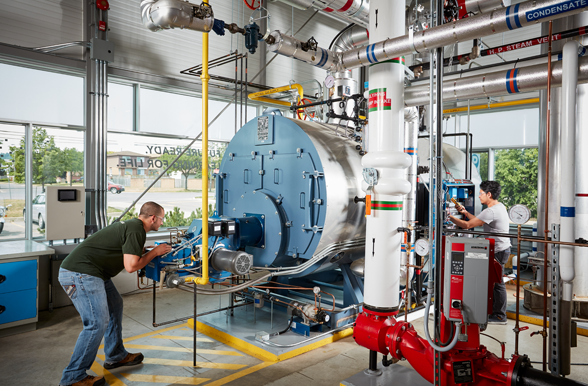Power Engineering Techniques - 482
Overview
Program Highlights
- Accredited by the Technical Standards and Safety Authority (TSSA), providing an opportunity for reduced operator time towards certification.
- Gain the academic and practical experiences necessary to succeed as a Power Engineer, from real-life experiences taught by certified Operating Engineers.
- There is a high demand for operating engineers at all levels and 4th Class Power Engineers may decide to pursue higher certification, up to and including, 1st Class.
What you'll learn
- Explore the use of steam firetube boilers, air compressors, refrigeration chillers, chemical feed pumps and various auxiliary equipment.
- Understand the use of prime movers, turbines, and co-generation processes.
- Understand the importance of electrotechnology, instrumentation, combustion and the environmental impacts in a steam plant.
- Prepare for the Technical Standards and Safety Authority 4th Class Power Operating Engineering exams, both 4A and 4B.
View the Exceptions Calendar for start dates and semester break information.
Program Length
1 academic year (period of 11 months)
Admission
Admission
Domestic and International student admission requirements
- OSSD or equivalent (Mohawk Academic Upgrading, GED) including:
- Grade 12 English, C or U or equivalent
- Senior Mathematics is recommended
Options are available for mature applicants.
Language Requirements for Applicants with English as a Second Language
- See below for accepted equivalents for Grade 12 English:
- Successful completion of the GAS-English for Academic Purposes (478) program
- TOEFL minimum score of 550 (80 Internet based)
- or IELTS Academic minimum score of 6.0 overall with no band less than 5.5
- More information about acceptable certificates, can be found on the International Admission Requirements
Applicants whose first language is not English will be required to demonstrate proficiency in English.
Don't have the necessary requirements?
Tuition and Fees
Tuition and Fees
2024 - 2025 Domestic Tuition and Fees
| Description | Semester 1 | Semester 2 |
|---|---|---|
| Compulsory Ancillary Fees | $881.96 | $785.16 |
| Co-op Fees | N/A | N/A |
| Compulsory Program Fees | $0.00 | $0.00 |
| Domestic Tuition | $1,354.04 | $1,354.04 |
| Total Domestic Charges Per Semester | $2,236.00 | $2,139.20 |
| Total 1st Year Fees | $4,375.20 | |
Above fees based on full-time September program start date. Contact Student Services to confirm fees for other start dates or semesters.
- Full Cost Breakdown
- Explore payment options
- Book costs for your program can be found through the Campus Store
- You will also be required to purchase safety equipment, tools/supplies and/or exam fees. Full details will be provided in your classes or at your orientation. This is an additional cost (above tuition/ancillary fees and textbooks).
2024 - 2025 International Tuition and Fees
| Description | Semester 1 | Semester 2 |
|---|---|---|
| Total Tuition & Ancillary Fee | $8,525.00 | $8,525.00 |
| Co-op Fees | N/A | N/A |
| Program Compulsory Fees | $0.00 | $0.00 |
| International Tax Recovery | $450.00 | $375.00 |
| Total International Per Semester | $8,975.00 | $8,900.00 |
| Total 1st Year Fees | $17,875.00 | |
If you pay by wire transfer, please note your bank might charge you a fee to transfer money. Make sure your transfer includes the Mohawk payment and the wire transfer fee. This applies to each wire transfer payment you make.
- Explore payment options
- Book costs for your program can be found through the Campus Store
- You will also be required to purchase safety equipment, tools/supplies and/or exam fees. Full details will be provided in your classes or at your orientation. This is an additional cost (above tuition/ancillary fees and textbooks).
Additional Information
Financial Assistance
Financial Assistance
When it comes to paying for your education, investing in your future can be more affordable than you think. A Mohawk education is one of the most cost-effective means of acquiring the skills and knowledge you need to have a prosperous and rewarding career.
As you start on your chosen career path, it's important to have a realistic set of expectations regarding the expenses associated with attending college. In addition to your tuition fees, you will also need to budget for books, supplies, housing, and other related living expenses. You may be able to supplement your income and savings with scholarships, bursaries, or loans. It pays to do some research into what types of financial assistance you may qualify for.
Available Financial Assistance Resources:
 OSAP Eligible. Learn about Ontario Student Assistance Program - OSAP (domestic students only)
OSAP Eligible. Learn about Ontario Student Assistance Program - OSAP (domestic students only)- Working on Campus
- Additional Sources of Funding
- Financial Assistance Home Page
Apply for Awards:
By submitting a Scholarships and Bursaries Application every semester, students have access to over $3 million in Mohawk College scholarships, bursaries and Ministry-partnered funding to help meet their financial needs.
Financial Literacy:
Whether saving for school, sticking to a budget, or planning for a major purchase, financial literacy affects us all. That's why Mohawk College is dedicated to helping students improve their financial literacy and become more confident in managing their money.
- Complete the free online Money Matters Module to earn Co-Curricular Credit!
- Financial Resources and Calculators
Program of Studies
Course Overview & Descriptions
Click on the course title for a course description.
*Field placement runs between April to August
Experiential Learning
Experiential Learning
How you'll gain skills
- Hands-on engagement in our labs including electrical, combustion, piping, welding, millwright and computer simulators for ammonia and power plant operations.
- Operation of on-site Steam Lab with actual operating equipment.
- Acquire industry skills in an unpaid Field Placement.
To learn more, please visit the Centre for Experiential Learning.
Field Placement
A field placement is intended to give students hands-on experience in the workplace. After successful completion of all required courses, students complete a mandatory 480-hour placement in their final semester. The successful completion of the field placement is required for graduation. Please visit the Centre for Experiential Learning for more information on the field placement for this program.
- Field placement opportunities are not guaranteed as they are solely dependent upon employer engagement.
- Successful completion of a 4th Class Power (Operating) Engineer 4A or 4B exam may be required by some employers prior to students being allowed to start the program’s field placement.
Learning Outcomes
Learning Outcomes
Program Learning Outcomes, often referred to as ‘Program Standards', set out the essential learning that a student must achieve before being deemed ready to graduate.
In many cases these program learning outcomes were developed by the Ministry of Colleges and Universities (MCU) in consultation with employers and educators who are experts in the program field. To ensure the outcomes remain current and in line with industry needs, we invite our employers, graduates working in the field and current students to re-examine and update them during regular, ongoing program review focus groups.
Career Opportunities
Career Opportunities
Your future career options
- 4th Class Power (Operating Engineer)
Where you could work includes:
- Power Generation
- Oil Refineries
- Steel Industry
- Pulp and Paper
- Mining
- Food Processing
- Hospitals
- Commercial Buildings
- Facilities Environmental Management and Control
Opportunities for grads
- Institute of Power Engineers
- Inspection certifications
- Refrigeration certifications
- Technical Standards and Safety Authority (TSSA)
Educational Pathways
Educational Pathways
Pathways to Mohawk
If you've successfully taken a course at another post-secondary institution, you may be able to earn course exemptions toward your credential here at Mohawk.
If you have successfully completed one of the following programs at Mohawk, you may be eligible to receive transfer credit in this program. To start a new program at Mohawk, you must apply via ontariocolleges.ca.
Transfer from
You can transfer to the Power Engineering Techniques - 482 from the following programs:
Gas and Oil Burner Technician 2
Utilities Systems Operator
Receiving Program
Power Engineering Techniques
Transfer to
You can transfer from the Power Engineering Techniques - 482 to the following programs:
Gas and Oil Burner Technician 2
Utilities Systems Operator
Power Engineering Techniques - 3rd Class
Mohawk College makes every effort to ensure the accuracy of each transfer opportunity. Please note that changes may occur in program offerings, admission requirements, and transfer credits granted by the receiving institutions. We advise all students to check with the receiving institution directly for the most up-to-date information.
Don’t see what you’re looking for? Search ONTransfer.ca for more pathways with Ontario public colleges and universities.
Mohawk College makes no warranty or endorsement of material contained within links to external websites, nor does the College assume any responsibility for the linked website or its contents.
Additional Information
Additional Information
- Students of the Power Engineering program will be accredited with qualifying steam time, at the discretion of a qualified Power Engineer: the professor will provide an explanation at the start of the program
- Students must be prepared to travel
- For additional information visit the Technical Standards & Safety Authority (TSSA) (opens new window) website.
Faculty
Program Coordinator
Neil McCuaig
Faculty
Contact Us
Contact us
Domestic Canadian Students
Contact Student Recruitment
Haven’t applied yet and have questions?
Contact our Student Recruitment team for information on programs, how to apply, and more.
Contact Admissions
Contact our Admissions advisors for help with your application.
Email Admissions
Book an Appointment ⤻
Phone: 1-844-767-6871
International Students
Contact International Student Recruitment
Contact our International Student Recruitment team for information on programs, how to apply, and student life.
Contact International
Email: intl.representatives@mohawkcollege.ca
Phone: 1-905-575-2254
Toll free phone numbers:
For general questions: 1-888-Mohawk9 (1-888-664-2959)
Contact International Admissions
Contact our Admissions advisors for help with your application.
Contact International Admissions
Phone: 1-905-575-2254
*Not all programs are international eligible. Please see our programs available for international students.
Accessible Learning Services
Are you a student with a confirmed or suspected disability? Visit our Accessible Learning Services website to discover how we can help you.
Program Coordinator
Neil McCuaig
We're here to help
We’re here for you to support applications and admissions by providing online and virtual service.
Applied and have questions?
The admissions team is available to help, you can contact them via Admissions or by phone at 1-844-767-6871.
Haven’t applied and need help?
Contact us or phone 1-844-767-6871.
Take a virtual campus tour
Explore Mohawk College from the comfort of home! Our virtual campus tours provide a guided visit of our buildings, labs, services, classrooms and athletic and recreation centre.
Program delivery
Learn about program delivery terms.
Please note: in-person, virtual, and hybrid classes vary according to the program and some programs may be in-person only. Refer to the Program Overview for more information.





